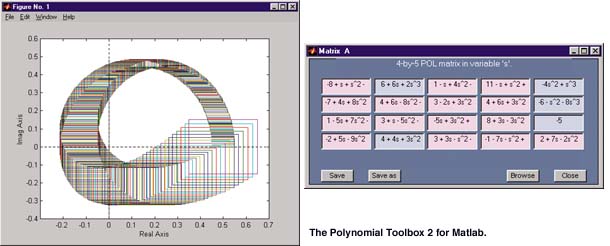Polynomial Methods for Systems, Signals and Control
by Michael Sebek
Polynomial methods are modern design techniques for complex multi-variable systems, signals and processes based on manipulations with polynomials, polynomial matrices, and other similar objects. Invented, developed to leading world-level and applied in Europe, the methods are considered typically European.
The theoretical background of polynomial design techniques for control systems can be traced back to the late fifties. However, their frontal attack to control theory started in seventies when the first really important results were achieved. The best known result is certainly the parameterization of all controllers that stabilize a given plant, now referred to as Youla-Kucera parameterization. In the eighties, the polynomial methods were used to solve robust control problems and employed also in the field of signal processing.
Algorithms and Software
In spite of many advantages, the polynomial methods were not fully successful in industrial application until recently. Due to the original lack of really workable (that is, efficient and reliable) numerical algorithms for polynomial matrices, no software was available for polynomial methods for quite a long time. In the nineties, this gap was filled by a concerted effort of research teams from the University of Twente and UTIA, Prague, supported by the European project ‘Algorithms for CAE (Computer Aided Engineering) based on modern polynomial methods in control’. This project increased interest in numerics for polynomial matrices resulting in several breakthroughs such as the first numerically stable procedures for various polynomial matrix problems or the new generation of very fast routines based on Fast Fourier Transformation. Another product of the project was the first version of the Matlab based software package called Polynomial Toolbox. The Polynomial Toolbox 1.5, a freeware publicly available via the web in 1997, appeared to be very successful: It was downloaded by more than one thousand users worldwide, one third from industry including major companies like Ericsson, Kodak and Daimler-Benz. In 1998, the former project participants founded a new company, PolyX, Ltd. aiming to further develop and commercialize software for polynomial methods.
The EUROPOLY Network
Formerly developed as a highly theoretical tool, polynomial methods are now successfully applied in a variety of engineering fields. Their advantages are naturally recognized by numerous industries ranging from the control of human muscles through automobile industry to the design of filters for mobile phones. Current polynomial activity in Europe is coordinated through the Network of Excellence for Industrial Applications of Polynomial Methods EUROPOLY. The Network is coordinated by UTIA Prague. It consists of thirteen European companies and research groups and many external members worldwide. The network maintains the EUROPOLY web site at http://www.utia.cas.cz/europoly/, issues a quarterly Newsletter and organizes regular meetings and workshops.
Polynomial Toolbox 2
In spring 1999, PolyX, Ltd. launched a new version of the package. The Polynomial Toolbox 2 for Matlab 5 is object oriented, far more user friendly, much faster and more reliable. It is currently the best software available for polynomials, polynomial matrices, and their application in systems, signals and control. It features:
- over 200 macros for polynomials and polynomial matrices - Objects, overloaded operations, functions, equation solvers, graphical user interface (GUI), graphics
- new generation of numerical algorithms: easy, fast, reliable
- system and signal models based on polynomial matrix fractions
- analysis and design tools for control and filters
- classical, optimal and robust design.
The Toolbox allows the user to define, display, and handle polynomial matrices with real and complex coefficients; to use many overloaded operations and functions; to generate 2-D and 3-D colour plots of polynomial matrices; and to work with polynomial matrix fraction descriptions of linear time invariant (LTI) systems. The Toolbox can also solve various linear and quadratic polynomial matrix equations and analyze and design control systems and filters by polynomial methods. Classical, optimal and robust design problems are solved. The Polynomial Toolbox is based on a new generation of numerical algorithms and provides a graphical user interface to edit polynomial matrices.

Users of the Polynomial Toolbox include control engineers involved in control systems analysis and design, communication engineers with an interest in filter design, and university teachers engaged in a variety of courses in linear systems, signals, and control. The Polynomial Toolbox version 2.0 is a package of as many as 200 M- files in MATLAB code but nevertheless is easy to use. It provides a Simulink block set for LTI systems described by polynomial matrix fractions and supports conversion to and from LTI objects of the Control System Toolbox and polynomial objects defined in the Symbolic Math Toolbox. Its application areas include communi-cations, control system design/analysis, educational instruction, general R&D, process control/monitoring and signal processing.
Links:
PolyX, Ltd: http://www.polyx.cz, or http://www.polyx.com
EUROPOLY Network: http://www.utia.cas.cz/europoly/
Please contact:
Michael Sebek - CRCIM
Tel: +420 2 6606 2314
E-mail: msebek@utia.cas.cz
